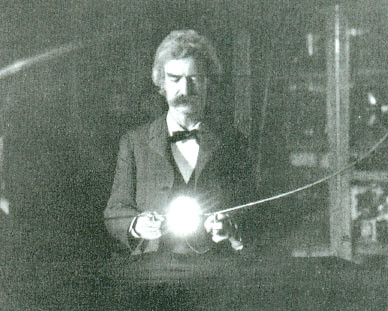In the midst of working on something for The Awl, I returned to Twain’s brilliant riff — from Is Shakespeare Dead? — on his boyhood obsession with Satan. Here it is, for the uninitiated.
When I was a Sunday-school scholar something more than sixty years ago, I became interested in Satan, and wanted to find out all I could about him. I began to ask questions, but my class-teacher, Mr. Barclay the stone-mason, was reluctant about answering them, it seemed to me. I was anxious to be praised for turning my thoughts to serious subjects when there wasn’t another boy in the village who could be hired to do such a thing. I was greatly interested in the incident of Eve and the serpent, and thought Eve’s calmness was perfectly noble. I asked Mr. Barclay if he had ever heard of another woman who, being approached by a serpent, would not excuse herself and break for the nearest timber. He did not answer my question, but rebuked me for inquiring into matters above my age and comprehension. I will say for Mr. Barclay that he was willing to tell me the facts of Satan’s history, but he stopped there: he wouldn’t allow any discussion of them.
In the course of time we exhausted the facts. There were only five or six of them, you could set them all down on a visiting-card. I was disappointed. I had been meditating a biography, and was grieved to find that there were no materials. I said as much, with the tears running down. Mr. Barclay’s sympathy and compassion were aroused, for he was a most kind and gentle-spirited man, and he patted me on the head and cheered me up by saying there was a whole vast ocean of materials! I can still feel the happy thrill which these blessed words shot through me.
Then he began to bail out that ocean’s riches for my encouragement and joy. Like this: it was “conjectured” — though not established — that Satan was originally an angel in heaven; that he fell; that he rebelled, and brought on a war; that he was defeated, and banished to perdition. Also, “we have reason to believe” that later he did so-and-so; that “we are warranted in supposing” that at a subsequent time he travelled extensively, seeking whom he might devour; that a couple of centuries afterward, “as tradition instructs us,” he took up the cruel trade of tempting people to their ruin, with vast and fearful results; that by-and-by, “as the probabilities seem to indicate,” he may have done certain things, he might have done certain other things, he must have done still other things.
And so on and so on. We set down the five known facts by themselves, on a piece of paper, and numbered it “page 1″; then on fifteen hundred other pieces of paper we set down the “conjectures,” and “suppositions,” and “maybes,” and “perhapses,” and “doubtlesses,” and “rumors,” and “guesses,” and “probabilities,” and “likelihoods,” and “we are permitted to thinks,” and “we are warranted in believings,” and “might have beens,” and “could have beens,” and “must have beens,” and “unquestionablys,” and “without a shadow of doubts” — and behold!
MATERIALS? Why, we had enough to build a biography of Shakespeare! Add a Comment



